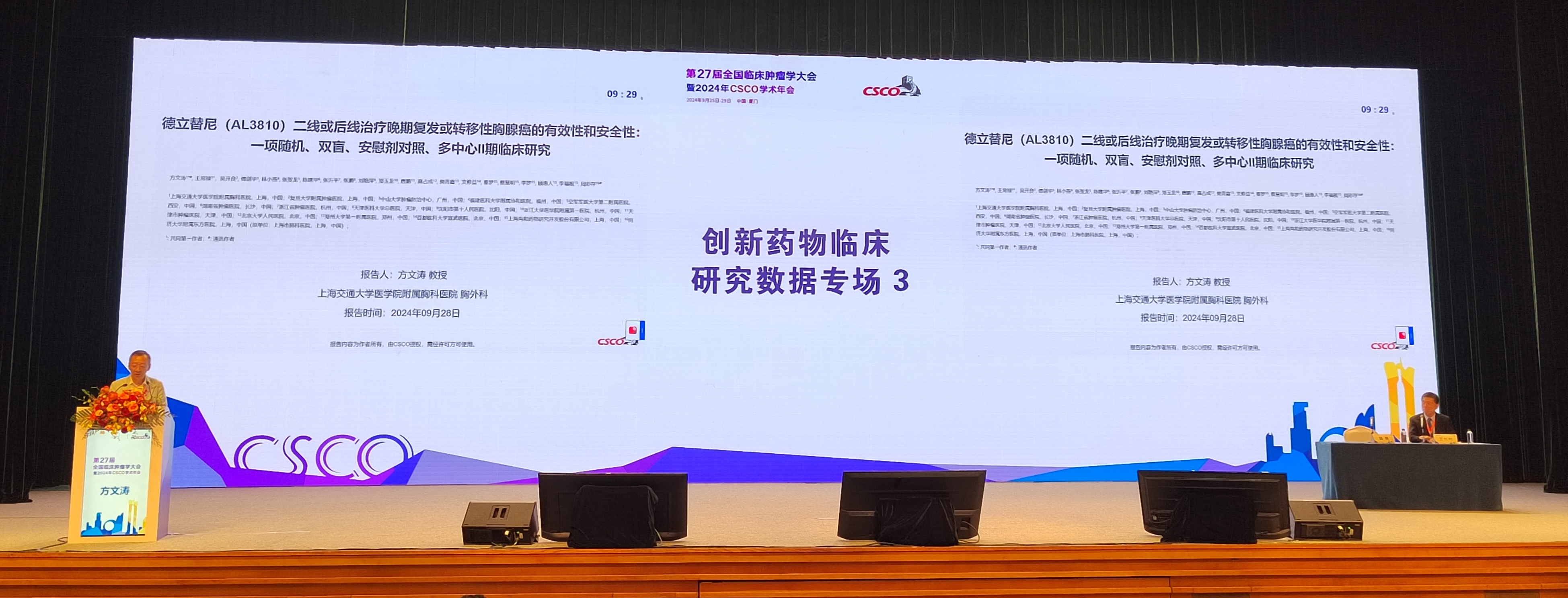

.jpg)

2024
Haihe Biopharma Co., Ltd. (hereby referred to as “Haihe Biopharma” or the “Company”) today announced that the main results of the paclitaxel oral solution and Lucitanib (AL3810) were both presented in the oral section of 2024 Chinese Society of Clinical Oncology (CSCO) Annual Meeting.
Study 1: An open-label, multicenter, randomized, non-inferior Phase III trial comparing the efficacy and safety of paclitaxel oral solution (RMX3001DHP107) versus paclitaxel injection (Taxol) in second-line treatment of patients with advanced gastric cancer

The Paclitaxel Oral Solution (RMX3001) in gastric cancer (GC) has been approved by the National Medical Products Administration- (NMPA) in Sep 19, 2024. The NPMA approval is based on positive results from an open-label, randomized, multi-center phase III study (CTR20190050) led by leading PI Professor Jin Li's team and Professor Shukui Qin's team in China, which was conducted at 53 centers in China and confirmed the efficacy of RMX3001 once again.
Between April 22, 2019, and January 31, 2022 (data cut-off date), 536 patients with unresectable or recurrent or metastatic gastric cancer progressed after fluoropyrimidine- or fluoropyrimidine plus platinum-based first-line therapy were randomly allocated to paclitaxel oral solution (n=268) or paclitaxel injection (n=268) group with median follow-up of 13.4 months and 12.6 months respectively.
Median progression-free survival assessed by BIRC was 3.02 months (95% confidence interval [CI]: 2.69, 3.71) in the oral group and 2.89 months (95% CI: 2.53, 3.48) in the injection group, demonstrating non-inferiority conclusion (HR 0.894, 95% CI: 0.719, 1.112, p=0.311). Median overall survival (as of February 15, 2023) was 9.13 months (95% CI: 7.72, 10.97) in the oral group and 6.54 months (95% CI: 5.75, 7.26) in the injection group, showing superiority with an absolute 2.59-month survival improvement (HR 0.770, 95.5% CI: 0.635, 0.934, p=0.006). Paclitaxel oral solution was clinically manageable. The most common grade 3 or higher treatment-related adverse events were neutrophil count decreased, white blood cell count decreased and anemia. Paclitaxel oral solution displayed improved safety profile with lower incidence in alopecia, neuropathy peripheral, fatigue, musculoskeletal and connective tissue disorders, hypersensitivity reactions than paclitaxel injection.
Study 2: A randomized , double-blind , placebo-controlled , multicenter Phase II clinical study to evaluate the efficacy and safety of Lucitanib (AL3810) in patients with advanced recurrent or metastatic thymic carcinoma who have failed at least one line of chemotherapy (study number: AL3810-202 )

There are limited treatment options once chemotherapy fails for patients with advanced thymic carcinoma. Lucitanib (AL3810) is a novel orally potent tyrosine kinase inhibitor, selectively targeting FGFR1-3, VEGFR1-3 and PDGFRα/β. At this Chinese Society of Clinical Oncology (CSCO) annual meeting, we reported the results of the first randomized, double-blind, placebo-controlled clinical trial (AL3810-202, led by Wentao Fang from Shanghai Chest Hospital and Caicun Zhou from East Hospital Affiliated to Tongji University) evaluating efficacy and safety of Lucitanib in patients with advanced recurrent or metastatic thymic carcinoma who have failed at least first-line of chemotherapy.
A total of 68 patients were enrolled, with 46 in Lucitanib group and 22 in control group.
Efficacy Results: Investigator-assessed median PFS was 6.6 months in Lucitanib group and 1.9 months in control group (p=0.0306, HR =0.53). The risk of disease progression or death was reduced by 47%. IRC assessed median PFS was 5.8 months in Lucitanib group and 3.7 months in control group (p=0.1050, HR=0.60). The risk of disease progression or death was reduced by 40%. The results of each subgroup analysis (based on forest plots) were consistent, indicating that the Lucitanib group had PFS benefits. In addition, multiple innovative statistical methods (such as weighted log rank tests, Restricted Mean Survival Time, Bayesian method) were used to conduct further post-hoc sensitivity analysis on the IRC assessed median PFS based on the characteristics of small sample size studies on rare diseases, and the analysis results all supported the main conclusion.
Safety Results: The most common TRAEs with Lucitanib were proteinuria, hypertension, hypothyroidism and thrombocytopenia. The most common grade 3 TRAEs with Lucitanib were hypertension, proteinuria and thrombocytopenia. No grade 4/5 TRAEs were observed.
This study suggests that Lucitanib may have significant clinical benefit and has acceptable safety for patients with advanced recurrent or metastatic thymic carcinoma.
Haihe Biopharma Co., Ltd is a global, values-based, R&D driven biopharmaceutical leader headquartered in China with operation centers in the US and Japan, and mainly focuses on innovative anti-tumor therapies. The company has the fully capability of drug discovery, development, manufacturing and commercialization and delivers life-saving therapies to cancer patients in China, even the world widely. As an R&D focused company led by an academician of the Chinese Academy of Engineering, Haihe Biopharma is committed in-house innovator with global perspective management and R&D team. Currently Haihe Biopharma has two approved products Gumarontinib (INN) in China and Japan and paclitaxel oral solution (RMX3001DHP107) in China and several drug candidates.